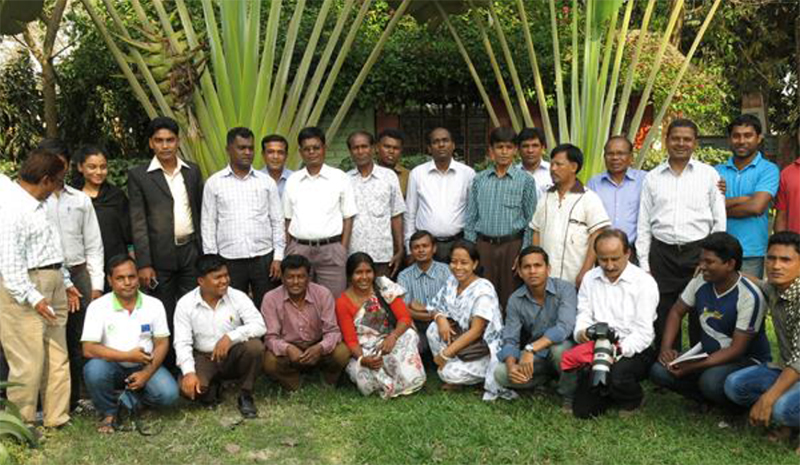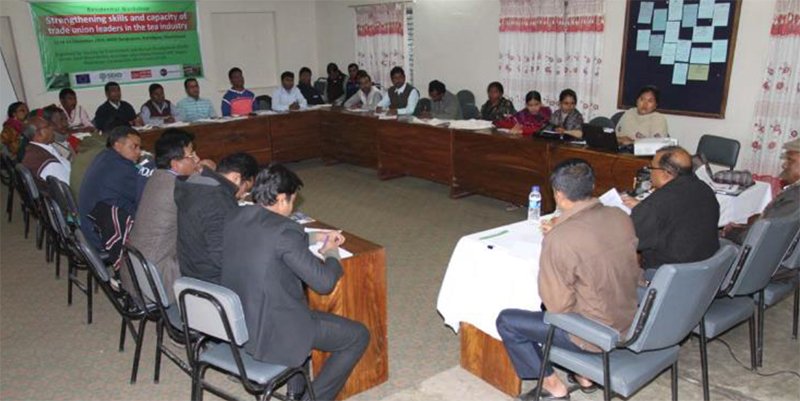
Perpetuating injustice against tea-workers
In his introductory remarks, the workshop moderator and director of SEHD, Philip Gain, reminded everyone that the learning objectives of the workshop were sharing knowledge on issues related to the rights of the tea workers and trade union; strengthening capacity of the trade union leaders in the tea industry through skill sharing and scaling up communication capability; and connecting tea workers’ union with national and international trade union activism.
Several trainers at the workshop particularly discussed the rights of tea workers guaranteed by the labour act, discrimination against the tea workers in the labour act, and violation of labour laws in tea industry. Tapan Datta, president of Chittagong Trade Union Centre and member of Chittagong Labour Court, mentioned article 183 of Bangladesh Labour Act, 2006 and said, “Article 183 is highly discriminatory and it contradicts with the ILO Convention No. 87 (adopted in 1948). Article 183 allows the tea workers to form a union only at the national level, and the law makes it mandatory that to form a union, 30 per cent of the total work force shall its members. Such legal restriction did not exist before the labour act of 2006.”
Bijoy Bunerjee, chairman of Rajghat Union Parishad and a trade union leader criticized the legal framework that actually allowed existence of only one functional union in the tea sector for such a long time.” On trade union is not ideal and for the trade unions to play a competitive role there should be two/three unions in the tea sector,” suggested Bijoy Bunerjee, “It also creates scopes for creation of new leadership.”
Bunerjee also talked about the vulnerability of the tea communities in tackling the challenge of unemployment. “We do not get jobs in the tea gardens other than tea leaf picking. Bangladesh Tea Board (BTB) and other public offices also do not treat us with respect and we get no job there,” lamented Bunerjee.
In reference to the garment industry, Elias Ali, leader of the Chittagong Trade Union Centre said, “Garment workers have greater opportunities to bargain as they can unionize at the factory level.” A strong urge arose from the workshop to decentralize the tea workers’ union, as it will speed up the tea workers’ movement for their rights.
In the tea industry, even the simple legal binding of appointment is not fulfilled. Other legal rights are like daydream for the tea workers. While talking about the legal rights of the tea workers and their materialization, Md. Azizul Islam, deputy inspector general (DIG) of Department of Inspection for Factories and Establishments, said, “The first condition for appointing a labourer is to issue an appointment letter, where all the terms and conditions of the job are written.” He said with regret, “Tea workers don’t even get an appointment letter. How would they know which legal rights are given to them and which are not?”
He discussed some basic rights of the workers like appointment letter, identity card, service books, labourer registration, ending owner-worker relationship, leaves according to the law, fair wages and allowances, proper education, housing, and entertainment. He said that these are legal rights of the workers, not demands; and as for the owners, depriving the workers of their rights is a punishable crime. Azizul Islam admitted his limits as a pubic servant. “We were appointed to inspect whether the workers have these rights. However, powerful owners, complicated bureaucracy, and weak laws do not allow us to properly carry out our duties,” lamented Islam. He believes that strong trade union and conscious workers are the ones who can claim their rights.
The tea workers do not have any land or house of their own. After retirement s/he is supposed to leave the labour line. The garden owners take advantage of this weakness of the workers. Senior legal counsellor of Solidarity Centre, Advocate AKM Nazism explained: “The owners deprive the workers of their gratuity or service benefits by offering their children work and allowing them to stay in the labour lines after retirement.” He argues, “Gratuity cannot be compromised for any opportunity or amenity. If it is, then it’s a clear violation of law.” He advised the leaders of Bangladesh Cha Sramik Union, “You demand gratuity at least from 2006; the garden owners are bound to give you your rights.” The participants of the workshop held that allowing the retired workers to live in the labour line on the condition that their dependents must work in the garden is forced labour, and it is a violation of the labour act.
The workers of tea industry are faced with extreme discrimination in terms of getting leaves. They do not get weekly and casual leaves. Md. Aziziul Islam explained: “The government has annulled the tea workers’ casual leave by legal provisions.” The owners use this law as a tool of exploitation. Azizul Islam said with grievance, “It is a matter of deep regret that the tea garden management does not even grant weekly leaves to the workers. What the workers get every week is weekly day-off, not weekly leave. Weekly leave means paid leave, which the workers are not given.”
Advocate Nasim questioned the labour act, “How can a country have two sets of law?” He directed questions to the government, “What is the difference between a tea worker and other workers? Why shall not the tea workers get 10-day casual leave annually like the workers in other sectors? Can’t they face inconveniences for which they might need leaves too? Why do other workers get one day of earned leave for every 18 days of work, and tea workers get one day of earned leave for every 22 days of work?”
Deputy Director of Directorate of Labour, Mohammad Giashuddin is unhappy about captivity of the tea workers and the wages they get. “The tea workers are confined to the labour lines of the tea gardens for generations, which is actually slavery,” said Giasuddin. On the wages the tea workers get he commented, “The wage of a tea worker is pathetic in its true sense. You can’t even afford a proper meal in a small hotel with their daily wage.” He talked about the necessity of a strong workers’ union to ensure the basic rights of tea workers, “A tea worker’s wage needs to be reasonable. If the same worker works outside the garden, s/he gets Tk.250-300 including one meal. Then why s/he would get Tk.69 for working in the tea garden? It is only strong trade union(s)that can play an important role in determining just wage of tea workers in accordance with the present market value.”
Syed Sultan Uddin Ahmed, assistant executive director of Bangladesh Institute of Labour Studies (BILS) discussed the significance of connecting the tea workers’ union with other national and international trade unions. “The tea workers’ union must communicate or establish relations with other like-minded trade unions. This communication or connection is the ‘unity’ and ‘solidarity’ of labour movement,” Ahmed who added with confidence, “The motto of the labour movement is ‘unity and solidarity’. Every worker must remember this mantra for life.”
Describing different adversities of labour movement, Sultan Uddin Ahmed said, “Politicians see our national trade union’s relation with the international ones as a conspiracy. But, it is a legal right of the labourers. Something that is a conspiracy to owners and the government is ‘unity and solidarity’ to the workers.”
Dr. Pradip Kumar Panday, associate professor of Mass Communication and Journalism of University of Rajshahi, conducted a session on communicating tea workers’ issues and grievances to the media and others interested. One fundamental tool of communication when an anomaly or incident takes place is press release that he discussed at length. He also gave some tips about writing simple reports and organizing press conferences. On the significance of these fundamental tools of communication, Dr. Pandey said, “People need to know the problems of tea gardens and tea workers. The workers and their representatives can play a role in sensitizing the media to publish more on their issues and plights. If I am in pain, I need to let my neighbours know about it.”
In the four-day residential workshop, a full day was devoted to fieldwork. The participants, most of them from tea communities, revisited their labour lines to rethink what problems they face in their daily lives and what they need most for change. Some of the acute problems they face are poor access to sanitation system, lack of decent housing, lack of standard education, unemployment of educated young people, gender discrimination, lack of safety at work, lack of medical care, and most of all, extremely low wages. Economic deprivation is identified to be the prime factor for terrible condition of the tea workers.
In the evaluation session at the end of the workshop, the participants said that the workshop has helped develop deep understanding and feelings about unity and solidarity among the tea workers, leaders, and their union to overcome the abysmal conditions of the tea workers. Kamol Bunarjee, president of Juri Valley appreciated the workshop that SEHD organized to strengthen the union of the tea workers. “This workshop has given us a direction to stay united and expedite our efforts to secure legitimate rights of the tea workers,” said Bunarjee.
Rambhajan Kairi, general secretary of BCSU, felt the need for more such workshops for the tea union leaders. “One workshop is not enough for the union leaders. But, this one has shown us the stairs and taught us how to start climbing. Now we have to climb the rest of the stairs ourselves,” said Kairi, who hoped that there would be more such workshops in future.
PDF version of report [ Download ]
Report by Abdullah Al Mahdee with Philip Gain
First published: Dhaka Courier, 30 January 2015.

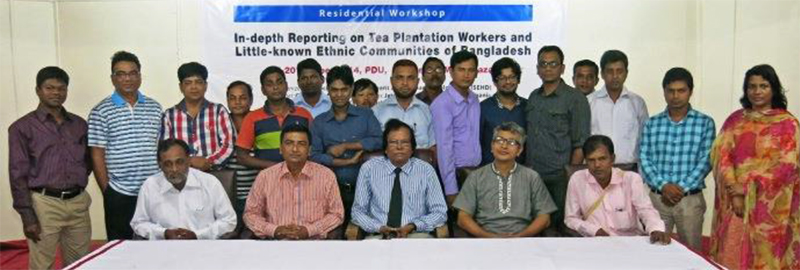
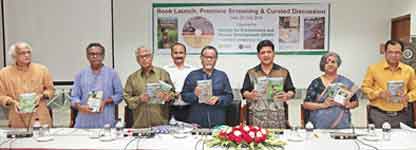
 Prof. Anu criticized the way the government setting up a coal-fired power plant near the Sundarbans, the largest contiguous mangrove forest in the world. Such plant [in Rampal in Bagerhat district] poses a serious threat to the Sundarbans. To make the situation worse Orion Group, a private company is planning to set up another 565 megawatt coal-fired power plant next to Rampal Power Plant and even closer to the Sundarbans [at Biddarbaon, Mongla) without following environmental rules and regulations.”
Prof. Anu criticized the way the government setting up a coal-fired power plant near the Sundarbans, the largest contiguous mangrove forest in the world. Such plant [in Rampal in Bagerhat district] poses a serious threat to the Sundarbans. To make the situation worse Orion Group, a private company is planning to set up another 565 megawatt coal-fired power plant next to Rampal Power Plant and even closer to the Sundarbans [at Biddarbaon, Mongla) without following environmental rules and regulations.”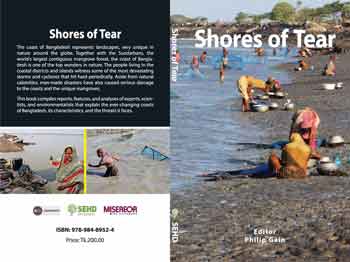
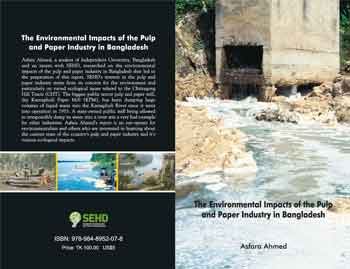
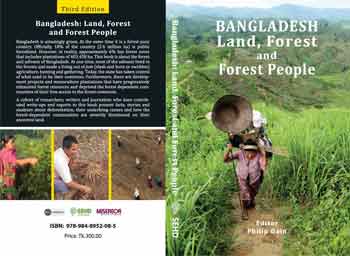
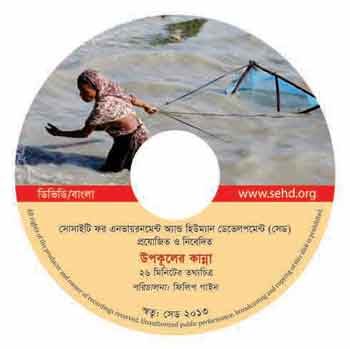
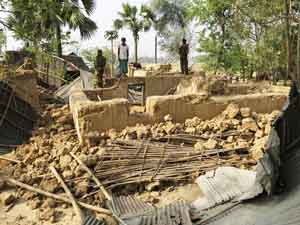
 and corrugated tin roofs have been leveled to the ground. Food grain, utensils, beds, clothes, cash, and other household materials are all broken and left mixed with mud. The families are left with nothing. They still have the courage to live around their homesteads in the hope of getting justice.
and corrugated tin roofs have been leveled to the ground. Food grain, utensils, beds, clothes, cash, and other household materials are all broken and left mixed with mud. The families are left with nothing. They still have the courage to live around their homesteads in the hope of getting justice.  members, reports, “A micro-bus carrying police stopped at our village in the morning. They were actually giving protection to the brothers (Fazur Rahman, Estab Ali and Anisur Rahaman) and around 150 men. Two more police van also arrived from Tanor Police Station. They started breaking our houses without paying any attention to our cries.”
members, reports, “A micro-bus carrying police stopped at our village in the morning. They were actually giving protection to the brothers (Fazur Rahman, Estab Ali and Anisur Rahaman) and around 150 men. Two more police van also arrived from Tanor Police Station. They started breaking our houses without paying any attention to our cries.”  “I was storing 14 maunds (one maund is equivalent to 40 kgs) of wheat, four maunds of mustard, and cash of Tk.5,000 of adivasi women’s organization, GOLAP, of which I am the cashier. I also had 20 maunds of paddy of my own. I begged them to allow me to enter my house. But they did not listen. I helplessly watched my house leveled to the ground. These foodstuffs and cash were all gone with my houses. The carnage went up to five in the evening.”
“I was storing 14 maunds (one maund is equivalent to 40 kgs) of wheat, four maunds of mustard, and cash of Tk.5,000 of adivasi women’s organization, GOLAP, of which I am the cashier. I also had 20 maunds of paddy of my own. I begged them to allow me to enter my house. But they did not listen. I helplessly watched my house leveled to the ground. These foodstuffs and cash were all gone with my houses. The carnage went up to five in the evening.”  conditions, still continue to live guarding the debris of their houses and the land. They were terrified at the “atrocious” approaches of people who demolished their houses; but the tiny Mahle community remains bold and believe that they will get justice.
conditions, still continue to live guarding the debris of their houses and the land. They were terrified at the “atrocious” approaches of people who demolished their houses; but the tiny Mahle community remains bold and believe that they will get justice. 